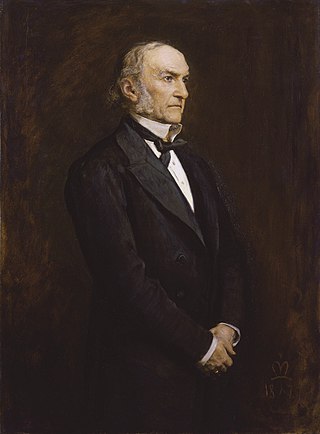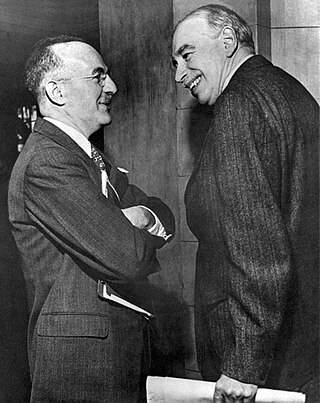Related Research Articles

The Liberal Party was one of the two major political parties in the United Kingdom, along with the Conservative Party, in the 19th and early 20th centuries. Beginning as an alliance of Whigs, free trade–supporting Peelites, and reformist Radicals in the 1850s, by the end of the 19th century, it had formed four governments under William Gladstone. Despite being divided over the issue of Irish Home Rule, the party returned to government in 1905 and won a landslide victory in the 1906 general election. Under prime ministers Henry Campbell-Bannerman (1905–1908) and H. H. Asquith (1908–1916), the Liberal Party passed reforms that created a basic welfare state. Although Asquith was the party leader, its dominant figure was David Lloyd George.
Classical liberalism is a political tradition and a branch of liberalism that advocates free market and laissez-faire economics and civil liberties under the rule of law, with special emphasis on individual autonomy, limited government, economic freedom, political freedom and freedom of speech. Classical liberalism, contrary to liberal branches like social liberalism, looks more negatively on social policies, taxation and the state involvement in the lives of individuals, and it advocates deregulation.
Keynesian economics are the various macroeconomic theories and models of how aggregate demand strongly influences economic output and inflation. In the Keynesian view, aggregate demand does not necessarily equal the productive capacity of the economy. It is influenced by a host of factors that sometimes behave erratically and impact production, employment, and inflation.

John Maynard Keynes, 1st Baron Keynes, was an English economist and philosopher whose ideas fundamentally changed the theory and practice of macroeconomics and the economic policies of governments. Originally trained in mathematics, he built on and greatly refined earlier work on the causes of business cycles. One of the most influential economists of the 20th century, he produced writings that are the basis for the school of thought known as Keynesian economics, and its various offshoots. His ideas, reformulated as New Keynesianism, are fundamental to mainstream macroeconomics. He is known as the "father of macroeconomics".
Post-Keynesian economics is a school of economic thought with its origins in The General Theory of John Maynard Keynes, with subsequent development influenced to a large degree by Michał Kalecki, Joan Robinson, Nicholas Kaldor, Sidney Weintraub, Paul Davidson, Piero Sraffa and Jan Kregel. Historian Robert Skidelsky argues that the post-Keynesian school has remained closest to the spirit of Keynes' original work. It is a heterodox approach to economics.
Social liberalism is a political philosophy and variety of liberalism that endorses social justice, social services, a mixed economy, and the expansion of civil and political rights, as opposed to classical liberalism which supports unregulated laissez-faire capitalism with very few government services.
In the United Kingdom, the word liberalism can have any of several meanings. Scholars primarily use the term to refer to classical liberalism. The term can also mean economic liberalism, social liberalism or political liberalism. It can simply refer to the ideology and practises of the historic Liberal Party (1859-1988), or in the modern context, of the Liberal Democrats, a UK party formed after the original Liberal Party's demise.

Embedded liberalism is a term in international political economy for the global economic system and the associated international political orientation as they existed from the end of World War II to the 1970s. The system was set up to support a combination of free trade with the freedom for states to enhance their provision of welfare and to regulate their economies to reduce unemployment. The term was first used by the American political scientist John Ruggie in 1982.

Abraham "Abba" Ptachya Lerner was a Russian-born American-British economist.
George C. Peden is an emeritus professor of history at Stirling University, Scotland.

Gladstonian liberalism is a political doctrine named after the British Victorian Prime Minister and Liberal Party leader William Ewart Gladstone. Gladstonian liberalism consisted of limited government expenditure and low taxation whilst making sure government had balanced budgets and the classical liberal stress on self-help and freedom of choice. Gladstonian liberalism also emphasised free trade, little government intervention in the economy and equality of opportunity through institutional reform. It is referred to as laissez-faire or classical liberalism in the United Kingdom and is often compared to Thatcherism.
Richard Ferdinand Kahn, Baron Kahn, CBE, FBA was a British economist.

Sir Richard Durning Holt, Baronet, JP was a British Liberal Party politician and businessman with interests in shipping.
Liberalism is a political and moral philosophy based on the rights of the individual, liberty, consent of the governed, political equality, right to private property and equality before the law. Liberals espouse various and often mutually warring views depending on their understanding of these principles but generally support private property, market economies, individual rights, liberal democracy, secularism, rule of law, economic and political freedom, freedom of speech, freedom of the press, freedom of assembly, and freedom of religion, Liberalism is frequently cited as the dominant ideology of modern history.

The Keynesian Revolution was a fundamental reworking of economic theory concerning the factors determining employment levels in the overall economy. The revolution was set against the then orthodox economic framework, namely neoclassical economics.
Economic liberalism is a political and economic ideology that supports a market economy based on individualism and private property in the means of production. Adam Smith is considered one of the primary initial writers on economic liberalism, and his writing is generally regarded as representing the economic expression of 19th-century liberalism up until the Great Depression and rise of Keynesianism in the 20th century. Historically, economic liberalism arose in response to feudalism and mercantilism.

The post-war displacement of Keynesianism was a series of events which from mostly unobserved beginnings in the late 1940s, had by the early 1980s led to the replacement of Keynesian economics as the leading theoretical influence on economic life in the developed world. Similarly, the allied discipline known as development economics was largely displaced as the guiding influence on economic policies adopted by developing nations.
Liberalism, the belief in freedom, equality, democracy and human rights, is historically associated with thinkers such as John Locke and Montesquieu, and with constitutionally limiting the power of the monarch, affirming parliamentary supremacy, passing the Bill of Rights and establishing the principle of "consent of the governed". The 1776 Declaration of Independence of the United States founded the nascent republic on liberal principles without the encumbrance of hereditary aristocracy—the declaration stated that "all men are created equal and endowed by their creator with certain unalienable rights, among these life, liberty, and the pursuit of happiness". A few years later, the French Revolution overthrew the hereditary aristocracy, with the slogan "liberty, equality, fraternity" and was the first state in history to grant universal male suffrage. The Declaration of the Rights of Man and of the Citizen, first codified in 1789 in France, is a foundational document of both liberalism and human rights, itself based on the U.S. Declaration of Independence written in 1776. The intellectual progress of the Enlightenment, which questioned old traditions about societies and governments, eventually coalesced into powerful revolutionary movements that toppled what the French called the Ancien Régime, the belief in absolute monarchy and established religion, especially in Europe, Latin America and North America.
The Social Liberal Forum is a pressure group and think tank which seeks to promote social liberalism within Britain. The Social Liberal Forum originated as a group that represented the centre-left within the British Liberal Democrats, but membership is now open also to people who are not members of the Liberal Democrats but who share the SLF's values and principles; since 2018 this has included liberal progressives of all parties and none. The SLF regularly organises fringe events at the twice-per-year Liberal Democrat Conference and, increasingly, provides speakers to events elsewhere.
Centre-left politics is the range of left-wing political ideologies that lean closer to the political centre and broadly conform with progressivism. Ideologies of the centre-left include social democracy, social liberalism, and green politics. Ideas commonly supported by the centre-left include welfare capitalism, social justice, liberal internationalism, and multiculturalism. Economically, the centre-left supports a mixed economy in a democratic capitalist system, often including economic interventionism, progressive taxation, and the right to unionize. Centre-left politics are contrasted with far-left politics that reject capitalism or advocate revolution.
References
- ↑ Who's Who 2013. A & C Black Publishers Ltd; 165th edition (3 Dec 2012).
- ↑ F. M. Leventhal, 'Reviewed Work: Lancashire and the New Liberalism by P. F. Clark', The Annals of the American Academy of Political and Social Science, Vol. 399, The Nation's Health: Some Issues (Jan., 1972), pp. 199-200.
- ↑ J. O. Stubbs, 'Reviewed Work: Liberals and Social Democrats. by Peter Clarke', Political Science Quarterly, Vol. 94, No. 4 (Winter, 1979-1980), p. 729.
- ↑ Susan Howson, 'Reviewed Work: The Keynesian Revolution in the Making 1924-1936 by Peter Clarke', The Economic Journal Vol. 100, No. 399 (Mar., 1990), p. 292.
- ↑ "Prof Peter Clarke, FBA Authorised Biography – Debrett's People of Today, Prof Peter Clarke, FBA Profile". www.debretts.com. Archived from the original on 29 June 2013. Retrieved 3 February 2022.
- ↑ "Fellows of the British Academy. UK Learned Society for Humanities and the social sciences - British Academy". Archived from the original on 4 March 2016. Retrieved 6 June 2013.
- ↑ "The Masters". Andrewsenior.com.